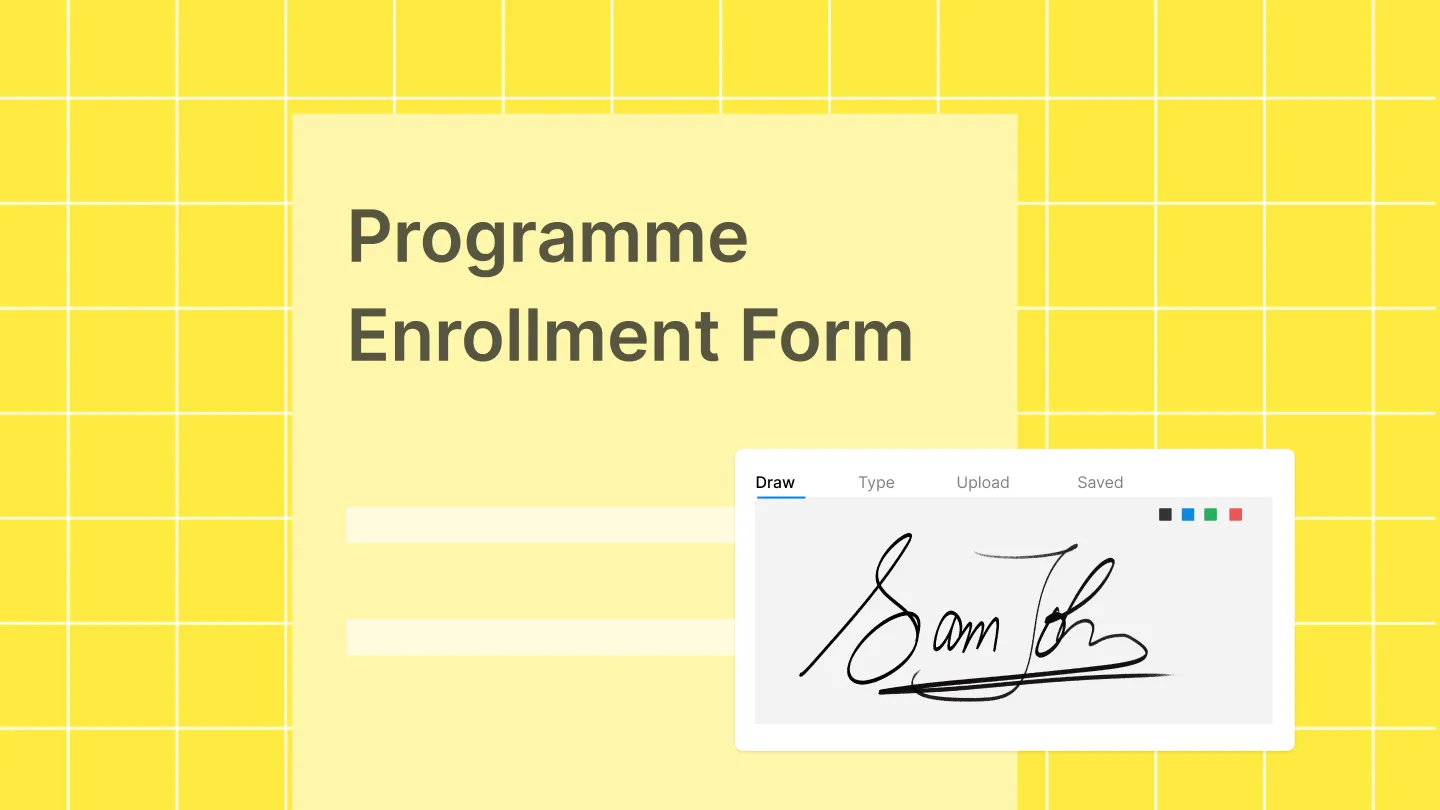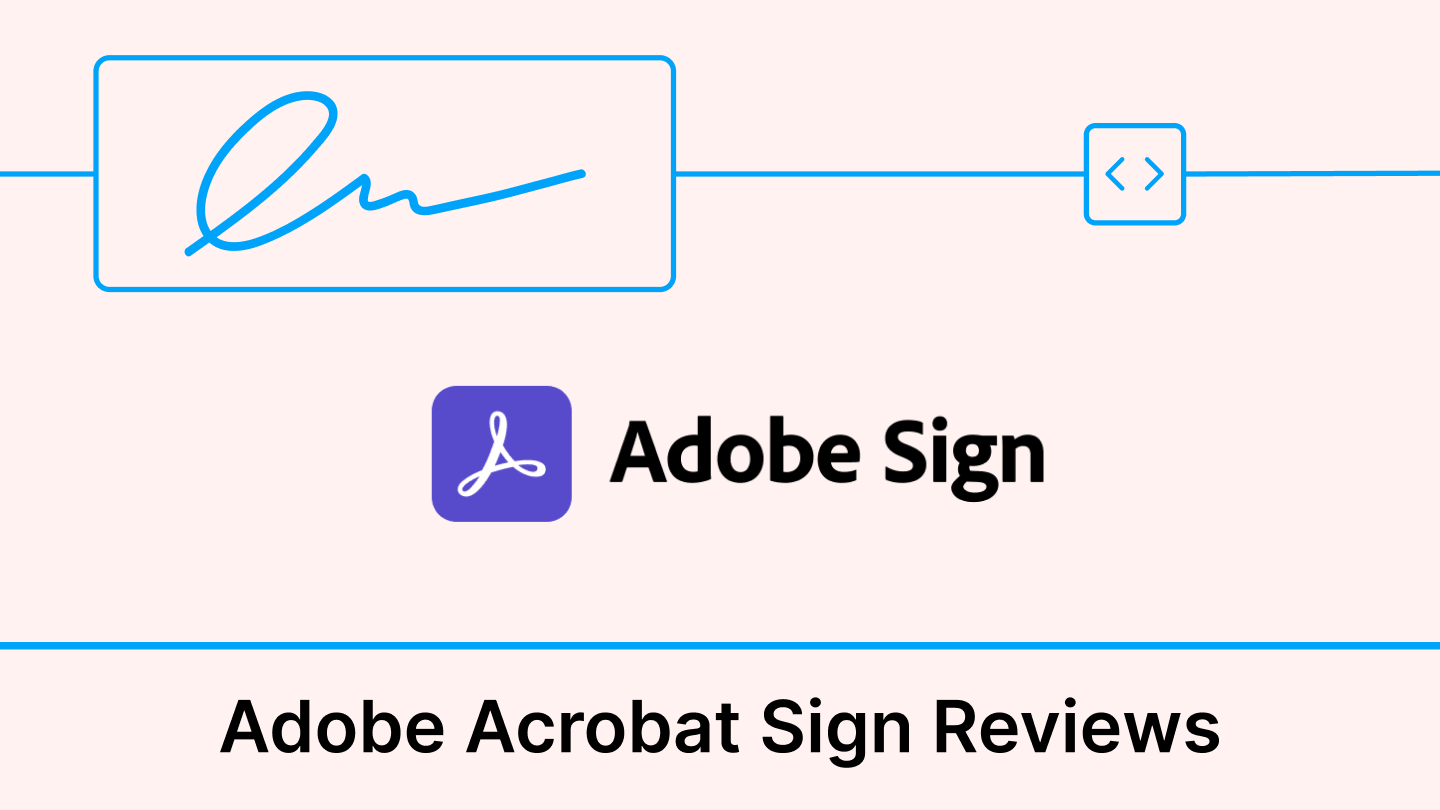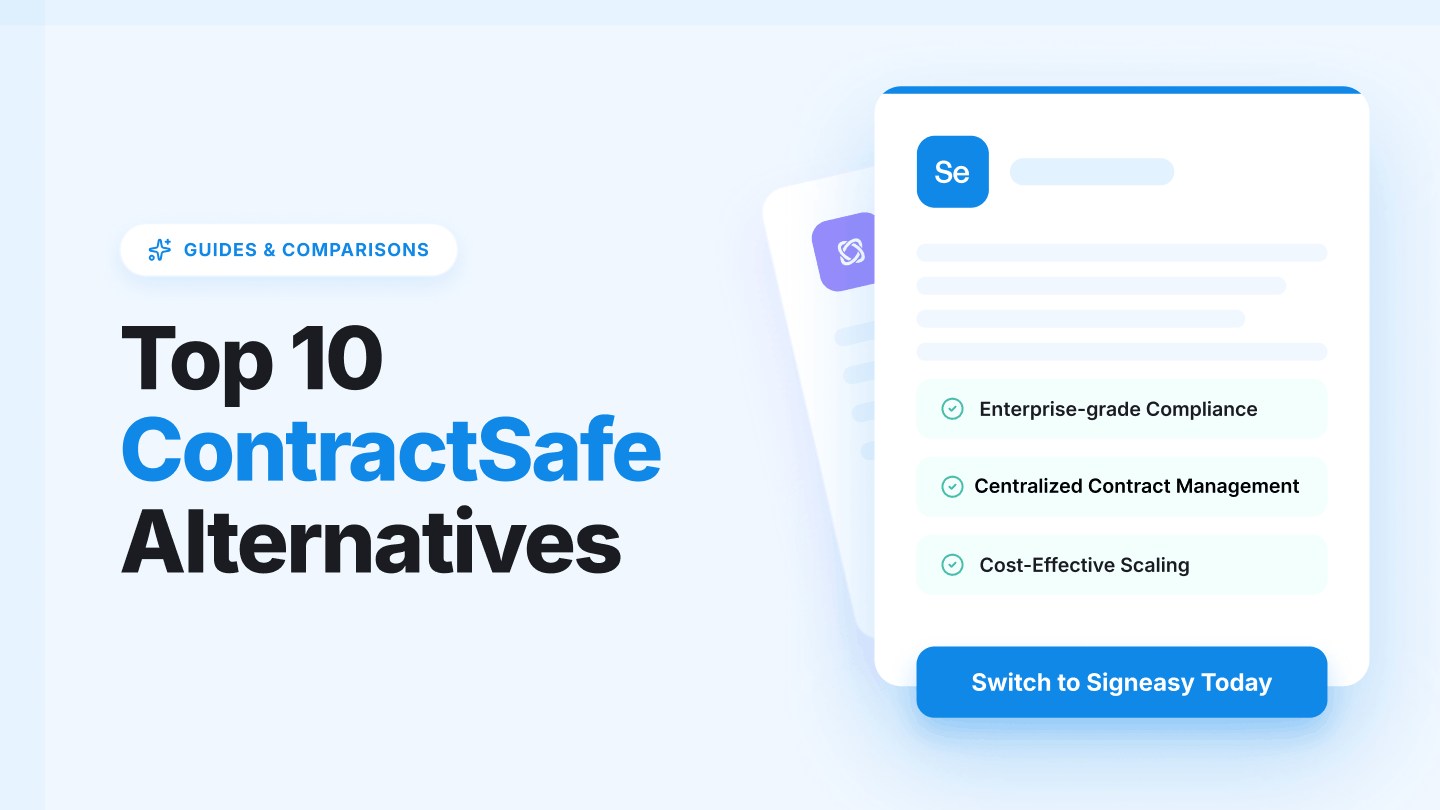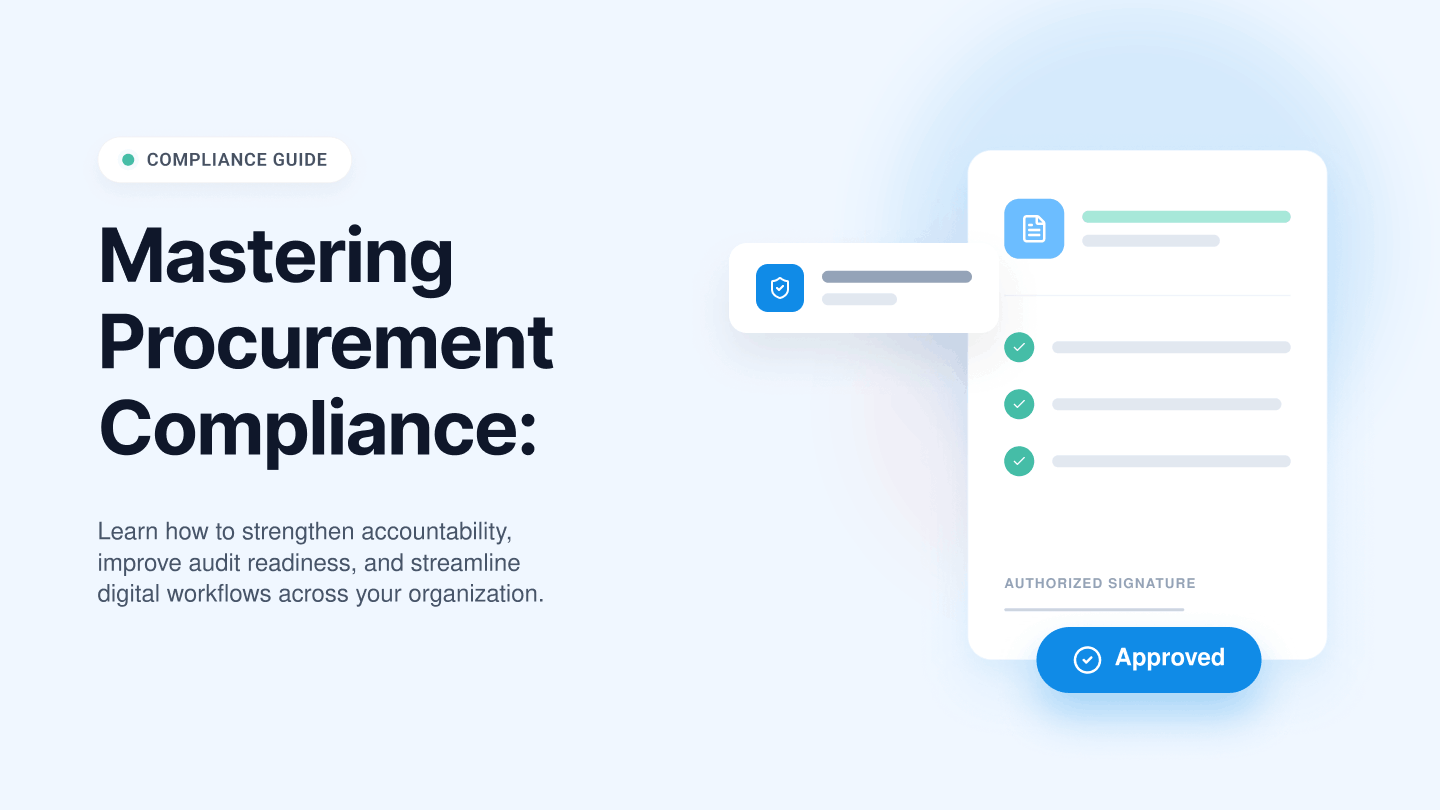Key takeaways
- Education contract management software brings all contracts into one place, automates approvals, and builds clear audit trails, helping institutions save time, reduce errors, and stay compliant.
- Schools, colleges, and universities use contract management software for simplifying everyday paperwork like admission forms, permission slips, assessment records, grant applications, leave requests, and policy acknowledgments.
- Common roadblocks include outdated systems, manual tracking, siloed oversight, and tools that lack secure mobile access.
- The right platform should support detailed audit logs, and integrate easily with your learning management system and other core systems. But not every provider is built with education’s realities in mind.
- Signeasy, PandaDoc, Ironclad, and Juro are all strong options, each with strengths depending on your priorities.
- Signeasy stands out for its intuitive interface, reliable mobile and offline signing, responsive support, and unlimited document plans, making it easy for educational institutions to adopt quickly without extra complexity.
In 2026, colleges and universities are navigating declining enrollment, rising operational costs, and shrinking budgets.
Many like Cornell University and Temple University have already announced staff reductions, frozen hiring, and cutbacks to programs. At the same time, there's increasing urgency to adopt new technologies, from AI-powered operations to digital workflows, without overloading teams or tech stacks.
So, if you are managing contracts across a college, university, or school network, scattered systems, manual approvals, and compliance risks are no longer viable. You need a platform that streamlines contract workflows across departments without requiring a heavy lift from IT.
What you require now isn’t another vague pitch but a clear comparison of the best education contract management software in the market.
We have done the legwork to help you choose.
This guide compares the top eight higher education contract software.
Top education contract management software at a glance
- Signeasy — Intuitive mobile-first interface with unlimited documents and rapid deployment (under 72 hours), ideal for K-12 through university multi-department contract workflows.
- CobbleStone Contract Insight — Robust CLM with public sector modules, AI clause matching, and compliance dashboards for state-funded educational environments.
- Icertis Contract Intelligence — AI-powered compliance and analytics on Microsoft Azure, built for large-scale university systems requiring enterprise-grade customization.
- ContractSafe — Secure contract repository with powerful keyword search, HIPAA compliance, and ease of use for admin and legal teams.
- PandaDoc — Drag-and-drop document builder with CRM integrations, well-suited for admissions and enrollment teams using Salesforce or HubSpot.
- Ironclad — Enterprise CLM with complex approval routing and AI contract analysis for high-volume university legal departments.
We will break down where each one fits best (and when it doesn’t), across pricing, usability, compliance, and support. Whether you are leaving behind paper processes or legacy tools, this guide will help you shortlist the right education contract management software for your team.
How we sourced our data
To build this guide accurately and objectively, we gathered data from multiple reliable sources. We reviewed official websites of all eight platforms to extract pricing, features, education relevance, and compliance details. To balance this with practical insights, we examined user reviews and ratings on trusted platforms like G2, Capterra, and Reddit. This gave us an understanding of both the feature sets and how each tool actually holds up in real-world education environments.
Our goal is to offer a practical, side-by-side view so you're comparing more than specs, and seeing which education contract management software genuinely meets your needs.
What is education contract management software?
Education contract management software is a centralized, secure digital platform that enables schools, colleges, and universities to create, store, manage, and track vendor agreements, faculty employment contracts, student housing agreements, research grants, and procurement documents. These platforms automate approval workflows, ensure regulatory compliance (including FERPA and GDPR), and reduce administrative costs and risks.
Education contract management software helps schools, colleges, and universities handle agreements across departments from creation to signature in one secure system.
It simplifies routine workflows like:
- Employment contracts for adjunct and full-time faculty
- MOUs between institutions or partner universities
- Student housing and scholarship agreements
- Procurement contracts for campus vendors and facilities
- Research grant agreements and intellectual property (IP) licensing contracts
While eSignatures are a core part of the process, these platforms also offer workflow automation, approval routing, reusable templates, and role-based permissions so legal, HR, faculty, and administrative teams can each work securely with the right level of access. Built-in audit trails and compliance tools support requirements like FERPA, GDPR, and state-level policies.
Many platforms also integrate with your existing systems from learning management systems (LMS) to student information systems (SIS), keeping everything connected. Features like renewal alerts, mobile access, and real-time reporting help teams stay ahead of deadlines and make faster decisions.
Whether you’re a small college or a large university, the right platform can reduce admin burden, strengthen compliance, and bring more transparency to every stage of the contract lifecycle.
Key benefits of education contract management software
1. Centralized Repository — Stores all contracts in a single, searchable location, breaking down departmental silos between HR, legal, procurement, and academic affairs for complete visibility across the institution.
2. Automated Workflows & Signatures — Streamlines approval routing and electronic signatures to accelerate contract execution, reducing turnaround times for faculty onboarding, vendor agreements, and student enrollment documents.
3. Compliance & Risk Management — Tracks obligations and deadlines, ensures compliance with FERPA, GDPR, and state-level regulations, and protects intellectual property in research and licensing agreements.
4. Cost Control & Analytics — Provides data analytics on spending patterns, vendor performance, and contract value to help institutions reduce unnecessary expenditures and make informed budgeting decisions.
Common education contract types managed by these platforms
Educational institutions typically manage these contract categories:
1. Faculty and adjunct employment agreements,
2. Student housing and scholarship contracts
3. Research grants and intellectual property (IP) licensing agreements
4. Vendor contracts for IT services
5. Facilities, and campus dining
6. Procurement and purchasing agreements
7. Inter-institutional MOUs and partnership agreements.
Why is contract management important for educational institutions?
Colleges and universities handle a constant flow of contracts pertaining to vendor agreements, HR forms, MOUs, and faculty appointments. When those documents live in inboxes or outdated systems, deadlines get missed, approvals stall, and oversight becomes a challenge.
With Signeasy, for instance, authorized signers like the provost, HR director, or registrar can set up automated reminders, track document status in real time, and keep all agreements in one centralized dashboard.
That means no more rushing to renew a vendor agreement or chasing down a student services contract that's about to lapse.
Just as important, it frees up people’s time to focus on high-impact work like supporting students and academic priorities.
- For students, it means quicker access to things that matter (scholarships, housing, internships) without admin delays.
- For faculty and staff, it reduces the hours spent following up for signatures or tracking documents, so they can focus on teaching, research, and student support.
The result is streamlined collaboration and a more cohesive operational experience across the campus.
What are the best education contract management software solutions?
With so many options available, choosing the right contract management software can be overwhelming. We’ve rounded up eight of the best solutions that cater specifically to the needs of educational institutions.
Here's a closer look at their features, benefits, and what sets them apart.
1. Signeasy
Signeasy offers a user-friendly eSignature and contract management tool ideal for educational institutions. With secure digital signatures, automated workflows, and easy integrations, Signeasy helps streamline student admissions, faculty onboarding, and admin tasks securely.
Take it from Moreland University. With hundreds of new candidates enrolling every month, their admin team was swamped with manual paperwork. However, once they integrated Signeasy’s API with their existing learning platform, their document turnaround time decreased by nearly 70%.
Shelbie Goodnow, who leads operations at Moreland, shared that enrollment agreements, MOUs, and verification forms now flow smoothly from sender to signer.
The result? Over 200 new candidates each month complete agreements from any device. The administrative workload dropped significantly, with fewer manual tasks. And, 43% of contracts are now signed within an hour.

Pricing
Personal ($15/month), Business ($30/month), Business Pro ($40/month), and a custom plan
Standout features
- With its cross-platform accessibility, Signeasy allows users to access and sign documents from anywhere, promoting flexibility and convenience.
- With features like secure document storage, audit trails, and compliance with eSignature laws, such as ESIGN and eIDAS, Signeasy ensures that all contracts and agreements are handled securely and in compliance with legal standards.
- Users receive real-time updates and email notifications regarding document status, ensuring timely actions and reducing delays in contract processing.
- Signeasy API helps educational institutions streamline administrative workflows, enhance security, and improve the student and staff experience through efficient, compliant, and remote-friendly eSignatures.
- Users can send multiple contracts (for example, faculty onboarding or student agreements) simultaneously to different recipients.
- Manages research grant documentation, IP agreements, and compliance paperwork alongside standard faculty and vendor contracts.
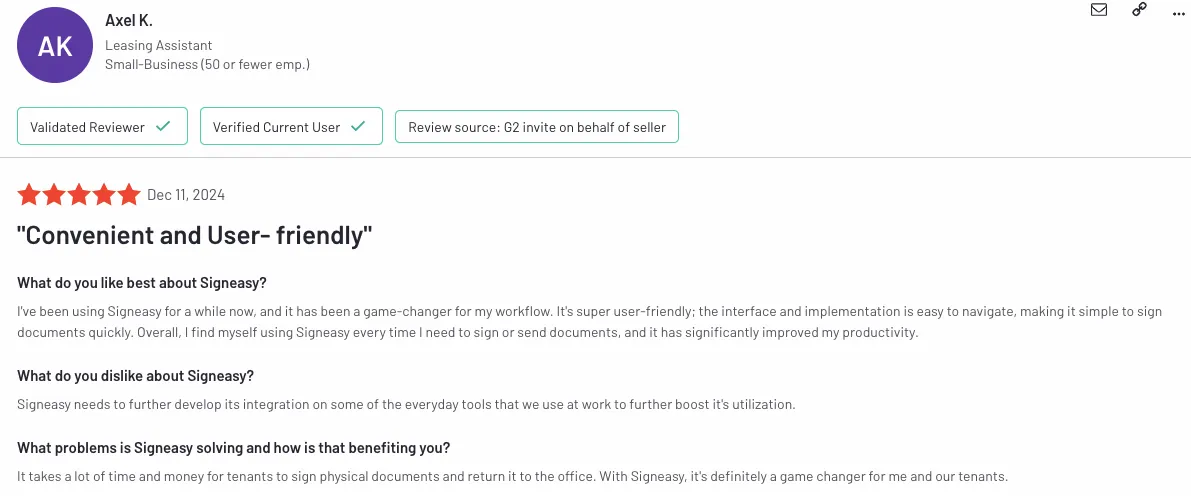
Pros
- It has a user-friendly interface with an intuitive design, making it accessible to users with varying levels of technical expertise.
- The platform offers multi-device support, allowing users to sign and manage contracts from anywhere via web, mobile, or tablet.
- It offers a library of reusable customizable templates.
- The platform uses AI to facilitate smarter contract reviews.
- It provides automated renewal alerts, reducing manual oversight.
.webp)
Cons
- While Signeasy offers several integrations, it may not support all applications used by educational institutions, such as learning management systems (LMS) and student information systems (SIS), potentially requiring additional workflow adjustments.
2. PandaDoc
PandaDoc is an all-in-one document automation and education contract management software designed to simplify the creation, delivery, tracking, and electronic signing of documents.
Pricing
Starter ($19/month), Business ($49/month), Enterprise (custom)
Standout features
- It automates approval processes and integrates with various CRM systems, facilitating seamless transitions between different stages of document management.
- The platform enables team collaboration through commenting and editing features, enhancing communication and efficiency.
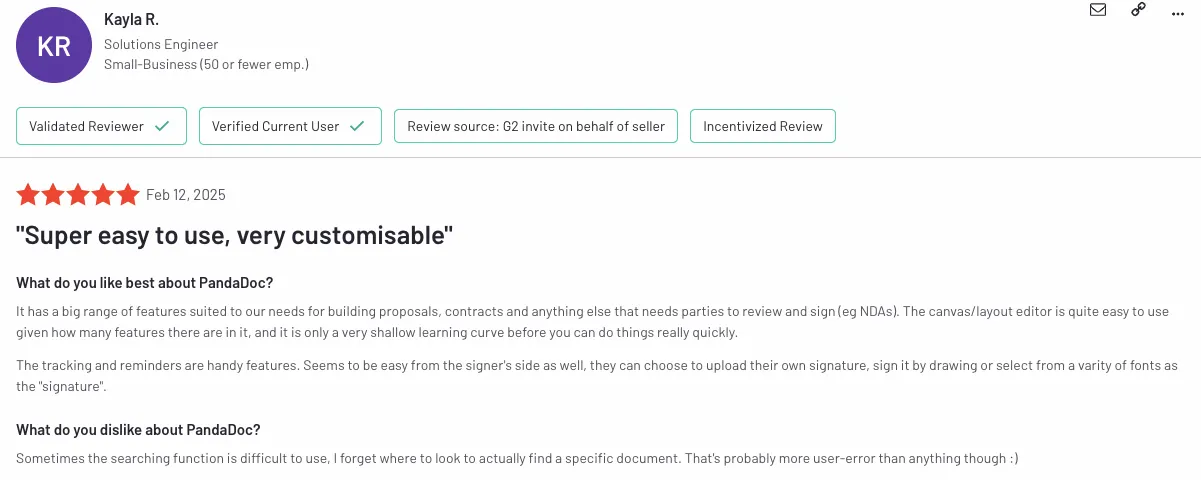
Pros
- It has a user-friendly interface.
- Users can monitor document status in real-time and access analytics to gain insights into engagement and performance.
- It integrates with popular tools like Salesforce, HubSpot, and Google Workspace, allowing seamless collaboration and document management.
Cons
- Some features may require higher-tier plans.
- May have a learning curve for advanced functionalities.
3. SignWell
An eSignature and document management platform, SignWell enables users to securely collect legally binding electronic signatures, track document status in real-time, and automate approval workflows.
Pricing
Free, Light ($10/month), Business ($30/month), and Enterprise (custom)
Standout features
- Users can customize documents with their own branding elements, such as logos and colors, to maintain a professional appearance and reinforce brand identity.
- SignWell can automatically send reminders to recipients who have not yet signed a document, helping to expedite the signing process and reduce delays.
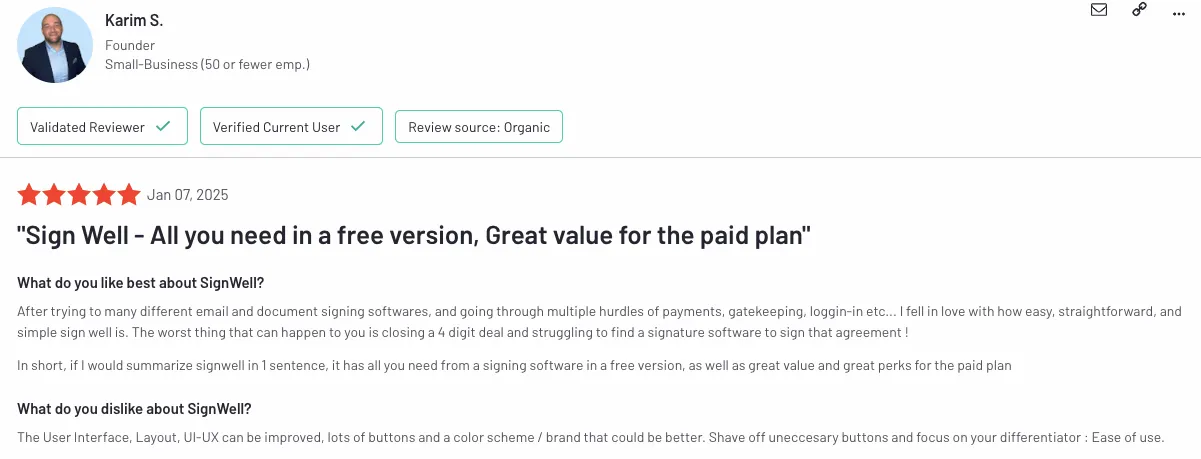
Pros
- Each document includes a detailed audit trail that records all actions taken.
- Users can set specific access controls and permissions to ensure that only authorized individuals can view or sign documents.
- It integrates seamlessly with over 5,000 applications, including popular tools like Gmail, Dropbox, and Slack.
Cons
- Some users complained of encountering glitches during the signing process.
- Advanced features, such as custom branding and data validation, require higher-tier plans.
- It offers limited customization in the free plan.
4. ContractSafe
ContractSafe is a cloud-based education contract management software designed to help institutions efficiently store, manage, and track their contracts. It offers a user-friendly interface that simplifies the complexities of contract administration, making it accessible to users without a legal background.
Pricing (based on features and contract volume)
Organize ($375/month), Finalize ($579/month), Maximize ($746/month)
Standout features
- ContractSafe emphasizes security with features like two-factor authentication (2FA) and single sign-on (SSO), ensuring that sensitive contract information is protected.
- The platform provides search capabilities and allows users to quickly locate specific contracts or terms within documents.
- It allows the creation of custom fields and tags, enabling tailored categorization and organization of contracts to suit specific business needs.
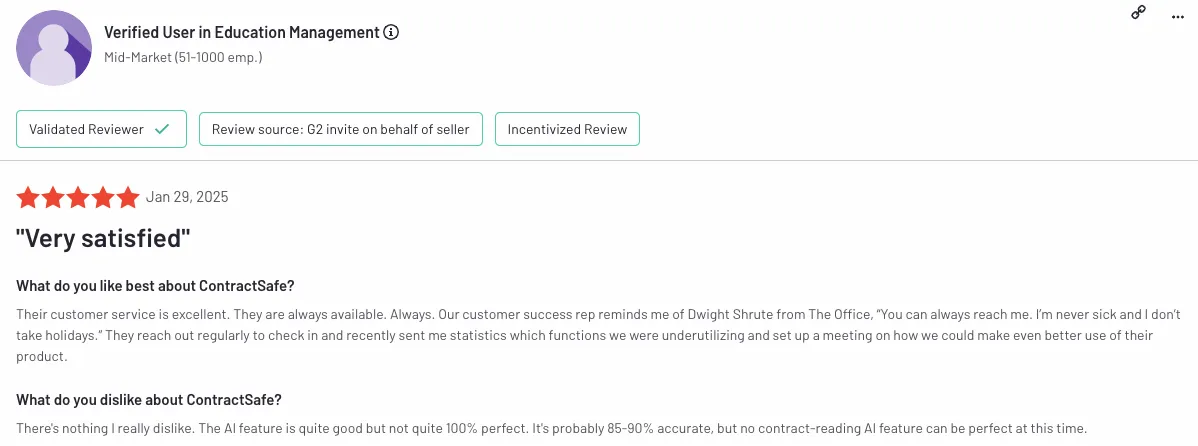
Pros
- It has an intuitive and user-friendly interface.
- ContractSafe is noted for its excellent customer service, providing timely assistance and support to users.
Cons
- It does not offer advanced workflow automation or in-app contract authoring and editing capabilities.
- Users found the platform’s AI feature to be ineffective.
- Some users complained about limited customization options on the platform’s dashboard.
5. Ironclad
Ironclad is a cloud-based contract lifecycle management (CLM) platform that enables legal and business teams to create, automate, and manage contracts digitally. Founded in 2014 and headquartered in San Francisco, California, Ironclad serves organizations of various sizes across multiple industries.
Pricing
Custom pricing based on needs
Standout features
- The platform’s AI-powered contract data analysis lets users automatically scan contracts to extract key legal terms and assist with contract redlining.
- Ironclad provides a secure, searchable repository for all signed contracts.
- Users can design and customize templates to quickly build any type of contract
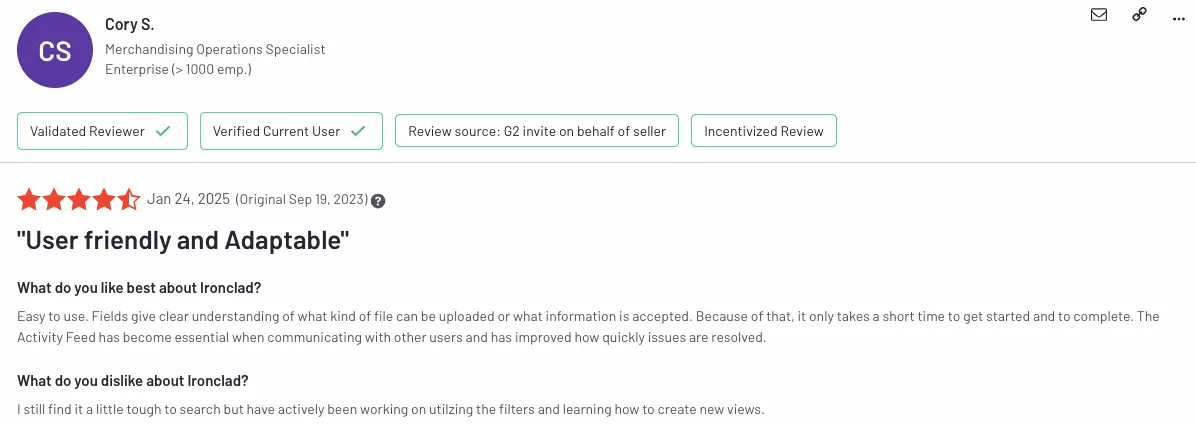
Pros
- Users appreciate Ironclad's intuitive interface.
- The platform's features, such as in-line commenting and activity feeds, promote effective collaboration among internal and external teams during contract negotiations.
- Suitable for large institutions
Cons
- Pricing plans are not available on the platform’s website.
- Some users have reported that configuring workflows to accommodate various contract scenarios can be time-consuming and challenging.
- Non-legal professionals may find the system's processes unfamiliar, indicating a need for additional training or user-friendly enhancements.
.png)
6. Juro
Juro is an AI-powered education contract automation software designed to streamline the creation, negotiation, approval, and management of contracts. It serves various teams within organizations, including legal, sales, HR, and finance, by automating the contract lifecycle and integrating with multiple business tools.
Pricing
Custom pricing based on institutional needs
Standout features
- Juro's AI Assistant helps users draft, summarize, review, and extract data from contracts up to 10 times faster.
- Users can generate contracts from pre-defined templates by answering simple questions.
- Juro offers a centralized, searchable repository for all contracts, allowing teams to find, query, filter, and report on contracts in seconds, improving visibility and management.
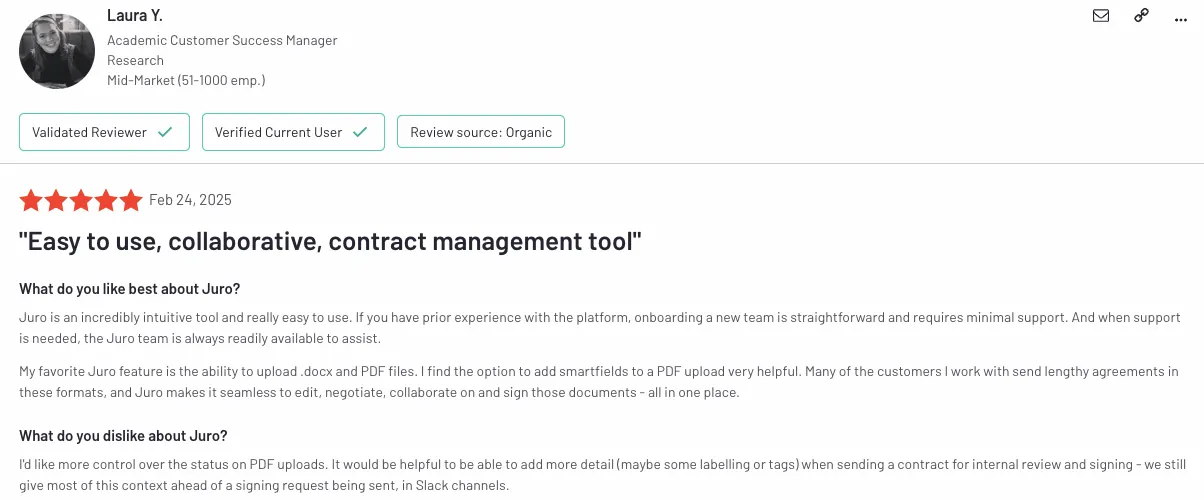
Pros
- The platform has an intuitive and user-friendly interface.
- The platform's features, such as mass contract creation and sending functionalities, have been highlighted as powerful tools for managing large volumes of contracts efficiently.
Cons
- Pricing is not publicly disclosed.
- Some users have noted that Juro's integration capabilities could be improved to better align with other tools used within their organizations.
- Users have identified areas for improvement in Juro's reporting functionalities, suggesting that more robust reporting capabilities would enhance the platform's utility.
7. CobbleStone Contract Insight
CobbleStone Contract Insight is an AI-enabled enterprise contract lifecycle management and eProcurement software solution developed by CobbleStone Software. Designed to streamline and automate the entire contract management process, it caters to organizations of various sizes across multiple industries, including government, healthcare, education, legal, banking, and retail.
Pricing
Custom/Enterprise pricing
Standout features
- The platform uses artificial intelligence and machine learning to enhance contract analytics, risk assessment, and decision-making processes, transforming static documents into dynamic digital assets.
- Users can tailor workflows to align with specific organizational processes.
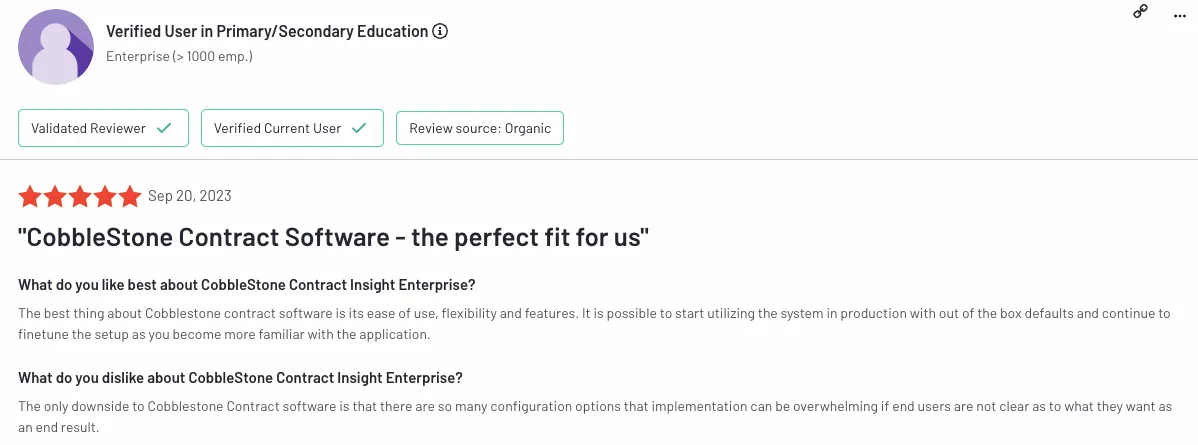
Pros
- The system effectively manages and tracks a large volume of contracts, improving organizational efficiency.
- Users commend CobbleStone's customer service for being professional, prompt, and helpful.
Cons
- Some users find the initial setup and configuration challenging, especially when customizing workflows.
- New users may experience a learning curve due to the platform's extensive features and capabilities.
- Implementation timelines can vary based on institutional needs
8. Icertis
Icertis is an education contract management software that helps organizations streamline and automate the entire contract process. It is known for its AI-driven contract intelligence, offering advanced capabilities for managing contracts across industries like healthcare, finance, manufacturing, and technology.
Pricing
Enterprise only
Standout features
- It manages all types of contracts throughout their entire lifecycle, from creation and negotiation to execution and renewal.
- The platform uses artificial intelligence and machine learning to extract and analyze data, identify risky clauses, monitor obligations, and ensure compliance.
- It integrates seamlessly with various enterprise systems, including ERP, CRM, and procurement solutions.
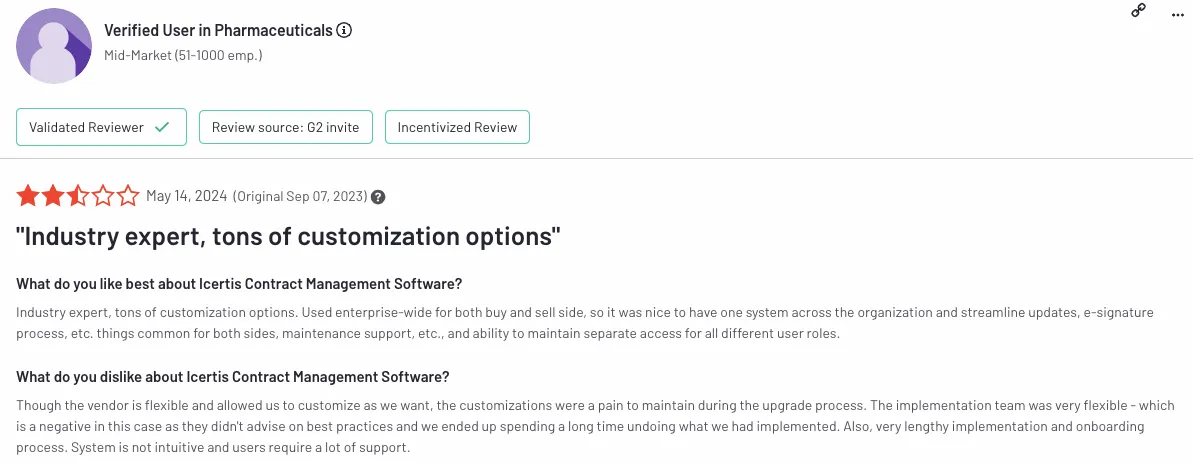
Pros
- Advanced AI capabilities enhance contract efficiency.
- Users appreciate having a single platform to store and manage all contracts, enhancing accessibility and organization.
Cons
- Some users feel that the platform could be more user-friendly and intuitive, suggesting that the user interface may require improvements to enhance the overall experience.
- Some users reported difficulties during the implementation phase, particularly when working with third-party implementation partners.
What are the common challenges in education contract management?
It’s not the volume of contracts that creates problems on campus. It’s the way they move (or don’t). In most colleges or universities, contracts are handled differently by every department: HR might use spreadsheets, procurement routes approvals via email, and legal still works in shared drives.
What you get is a messy, inconsistent system where critical documents get misplaced or are approved without proper review.
Here is what we commonly hear from operations, IT, and administrative leaders in colleges and universities:
1. Fragmented systems and manual tracking
Many institutions still rely on spreadsheets, shared folders, and inboxes to track contract status. This leads to missed deadlines, duplicate documents, and zero audit readiness.
The School of Visual Arts (SVA) in New York, a specialized arts college offering diverse undergraduate and graduate programs, needed an eSignature solution that was easy to use, integrated smoothly with Gmail and Google Drive, and reduced friction in routing documents internally and externally. Their existing tools struggled with authentication issues and disrupted the user experience.
“The sweet spot for Signeasy is its ease-of-use” - Brain Nakahara, IT Director, SVA
After trialing several tools, the IT team selected Signeasy for its seamless Gmail integration and intuitive interface. Staff can now open, sign, and send documents directly within their email window, speeding up the inter-office process.
2. Limited visibility across departments
Without a shared system, no one sees the full picture. The procurement team may think a contract is signed, while legal is still reviewing it.
Signeasy, by contrast, shows exactly where every contract stands: who’s viewed it, who’s signed, and where it’s stuck. Dashboards sort contracts by status, and CC options keep relevant team members in the loop.
Research agreements with IP provisions require centralized tracking to prevent compliance gaps and protect institutional intellectual property.
3. Slow, email-based or paper-based approvals
When approvals depend on email chains or printed documents, delays are almost inevitable. Contracts can sit unnoticed in inboxes or on desks for days, creating bottlenecks that slow down vendor onboarding, interrupt student services, and delay new partnerships.
The University of Pennsylvania’s Prevention Research Center, for example, replaced cumbersome paper consent forms with Signeasy to streamline a field study on skin cancer prevention. Using iPads, staff collected digital signatures from over 80 participants, emailed signed forms instantly, and organized documents by participant ID.
"Signeasy helped our study team reduce the burden of paper forms and organize our study documents more efficiently. It was extremely user-friendly and easy to use on the go." - Sara Grossman | Research Coordinator, UPenn
The switch eliminated the need to carry 200+ physical forms, saving time and improving efficiency.
4. Compliance risks
If your institution enrolls students from the EU (or partners with EU-based institutions), mishandling personal data such as names, addresses, or academic records can lead to violations under GDPR, including large fines and reputational damage. Education contract management software like Signeasy supports full compliance across the eSignature lifecycle — creation, signing, and storage — by meeting key global standards, including the U.S. ESIGN Act, UETA, GDPR, HIPAA (applicable to schools managing student health records), and the EU’s eIDAS regulation.
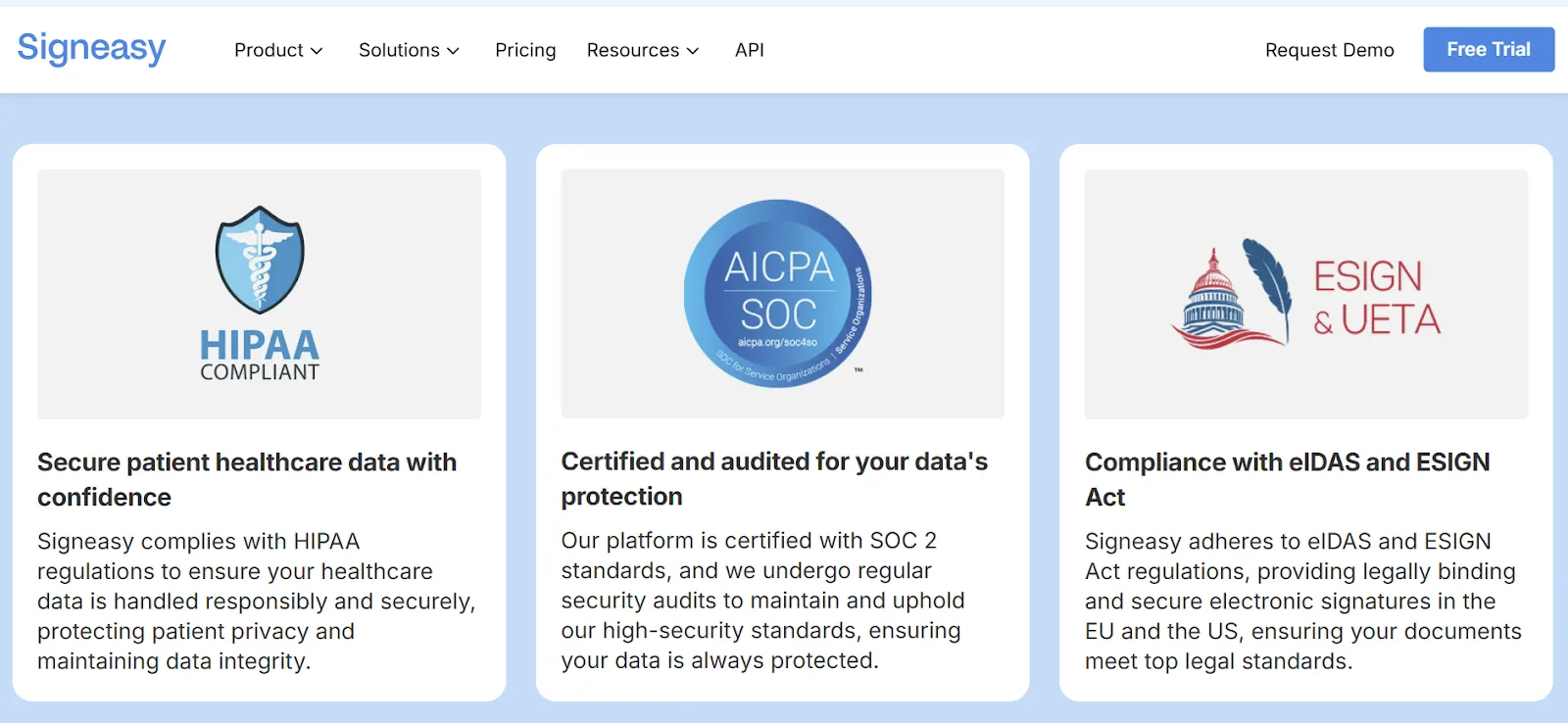
It is also SOC 2 Type 2 certified, with features like multi-factor authentication, timestamping, tamper-evident seals, role-based access, and detailed audit trails to help institutions safeguard sensitive documents with confidence and maintain readiness for audits or regulatory reviews.
5. Mobile access gaps
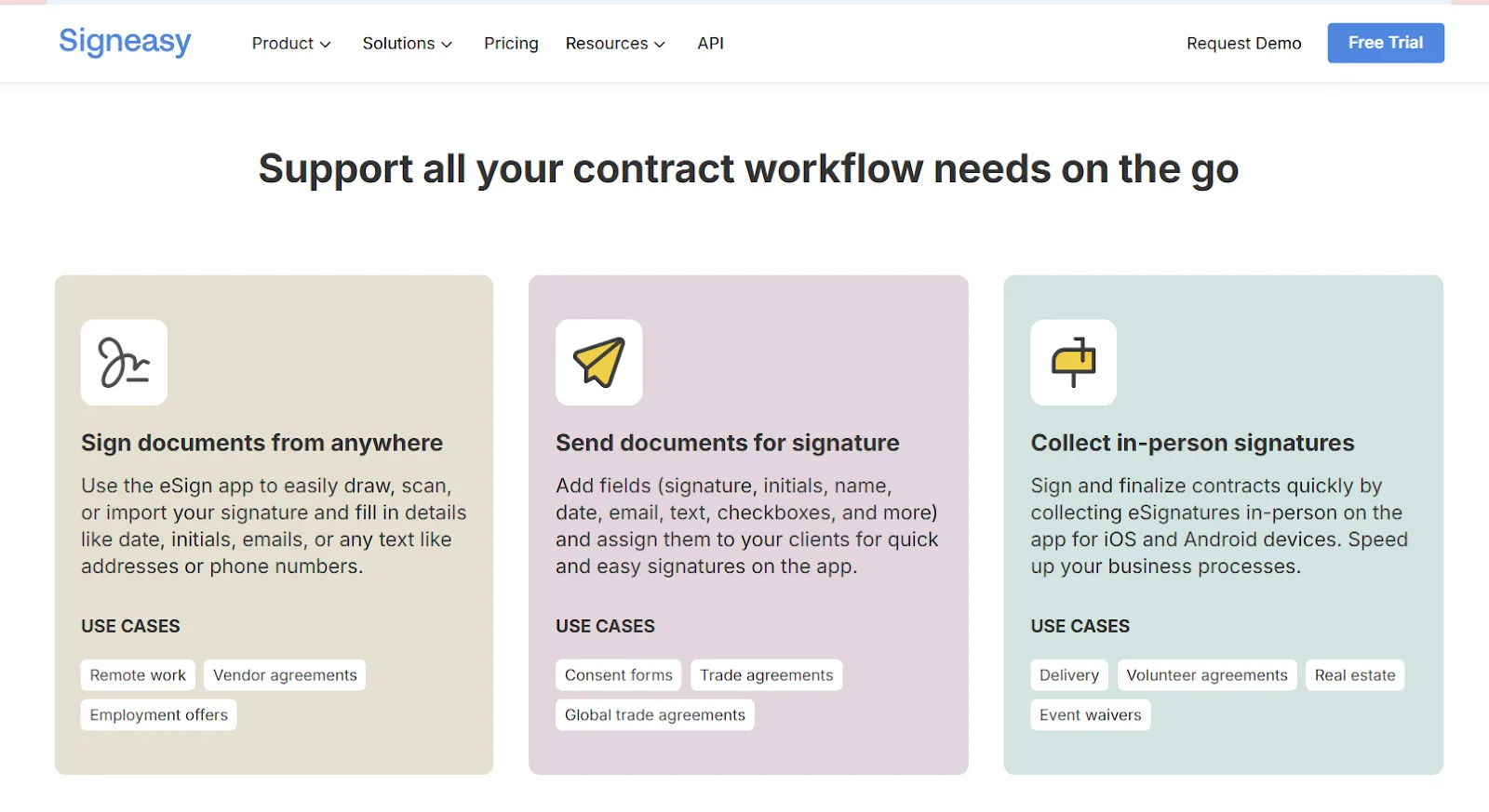
In hybrid campuses, staff often work across devices. Tools that aren’t mobile-ready cannot support real-world workflows like in-person signing or quick document reviews on the go. Signeasy’s mobile apps for iOS and Android let you sign and approve documents anywhere, even offline. Faculty, staff, students, or parents can review and complete contracts on the go, making it ideal for hybrid or multi-campus institutions.
The benefits of contract intelligence for education
Whether it’s a vendor agreement missing compliance language or a student contract lacking proper authorization, the consequences can include regulatory violations, funding delays, or legal disputes.
The more contracts you manage, the harder it is to keep everything moving. That’s why colleges and universities are turning to smarter tools that bring structure, visibility, and control to the entire contract lifecycle.
Contract intelligence refers to the ability of your platform to not only store and route documents, but also extract, track, and act on what's inside them. For education institutions, that can mean the difference between a missed renewal and a proactive renegotiation.
Here’s what smart education contract management looks like in practice:
- Find faculty contracts fast
Need to check which adjunct faculty are up for renewal next semester? Just filter by contract type or expiration date. You don’t have to spend time digging through folders. Take for example, Signeasy that lets you:- Store every agreement, faculty, vendor, student, in a single, centralized system
- Search by name, signer, or keyword to find what you need in seconds
- Maintain secure, role-based access so departments only see what’s relevant to them
- Catch funding deadlines before they slip
Set alerts for financial aid agreements or grant-funded partnerships, so you’re not caught off guard by expirations or automatic renewals.From vendor contracts in the science lab to HR forms in the nursing school, you can track every agreement by status and owner without jumping between systems.
- Scalable admissions and document workflows: Built for high-volume needs, Signeasy’s API, for example, processes thousands of forms, like admissions packets, consent forms, scholarship forms, and verification letters, in seconds. Universities can embed these workflows directly into their portals or apps, so students sign and submit without leaving the site.
- Automation across administrative workflows: API calls handle distribution, signing, tracking, and storage automatically, reducing manual steps and errors. Moreland University, for example, cut document turnaround times by up to 70% by embedding an education contract management software like Signeasy into its custom-built LMS for instant sign-and-enroll actions.
- Get AI summaries for faster contract decisions
With tools like Signeasy AI, you can see an AI-generated summary of any contract and pull out key terms, so you can see the essentials of a contract without reading it end-to-end. For faculty or administrators working on the go, whether in a budget meeting or between classes, this means quick answers without wading through pages of legal text. The right details surface immediately, helping decisions move faster and reducing the chance of missing something important.
Understanding these benefits is only half the equation. For education institutions, choosing the right higher education contract software also means making sure it can handle sensitive data and strict regulations without extra manual work.
Security and compliance that meet education standards
From admissions to vendor procurement, education teams handle highly sensitive information, which includes student records, financial aid details, employment contracts, health forms, and more. A single oversight can lead to compliance violations, data breaches, or reputational damage.
In this context, education contract management software is quite needed to protect this data without slowing down day-to-day work.
Tools like Signeasy use authentication methods like passwords, biometrics, or digital certificates to confirm who’s signing. These extra layers help prevent unauthorized access and reduce the risk of fraud.
Each signed document comes with a tamper-proof audit trail that logs when, how, and by whom it was signed: a critical feature for staying compliant with regulations.
Student consent forms, faculty appointments, HR paperwork, vendor contracts: each contract stays secure, properly tracked, and visible only to those who need it. Everything is logged, tracked, and protected. And because it’s digital, there’s no risk of missing paperwork or unnoticed edits buried in a file cabinet.
In short: fewer delays, stronger compliance, and a more dependable way to manage sensitive contracts across departments.
Once privacy and compliance are covered, the next step is evaluating what truly makes a contract management platform suitable for your campus needs.
How to choose the right contract management platform for your institution
Choosing the right contract management platform for your educational institution comes down to features that align with your operational needs. Whether your priority is scalability, automation, compliance, or integration with existing systems, the platform you choose should provide a structured, efficient way to manage contracts across departments.
Key factors to consider when selecting a contract management platform
- Automation and workflow management: Does the platform automate contract approvals, renewals, and compliance tracking? Can it handle bulk contract processing for faculty, students, and vendors?
- Scalability and customization: Can the platform adapt to your institution's growth? Does it support multi-campus contract management and integrations with SIS (Student Information Systems) or ERP tools?
- Security and compliance: Does it meet GDPR, and other education-related regulations? Does it provide audit trails and version control to ensure transparency and accountability?
- Centralized Storage and retrieval: Does the platform offer a secure, searchable repository where all contracts — faculty agreements, student waivers, vendor contracts — can be easily accessed?
- Integration capabilities: Does it seamlessly integrate with Google Workspace, Microsoft 365, finance software, or HR systems used by your institution?
Why Education Leaders Choose Signeasy
Signeasy simplifies contract management by providing a secure, automated, and scalable solution tailored for educational institutions.
- Automated workflows: Set up approval chains for student enrollments, faculty contracts, and vendor agreements.
- Legally compliant eSignatures: Ensure compliance with ESIGN, UETA, and GDPR without relying on paper-based processes.
- Centralized contract repository: Securely store, retrieve, and track contract versions across departments.
- Real-time visibility: Know exactly who has signed, who is pending, and what’s causing delays.
- Seamless integrations: Works with Google Workspace, Microsoft 365, and other tools used in educational settings.
By adopting Signeasy, educational institutions can reduce administrative burden, improve contract turnaround times, and maintain compliance effortlessly — allowing staff and faculty to focus on what truly matters: education.




